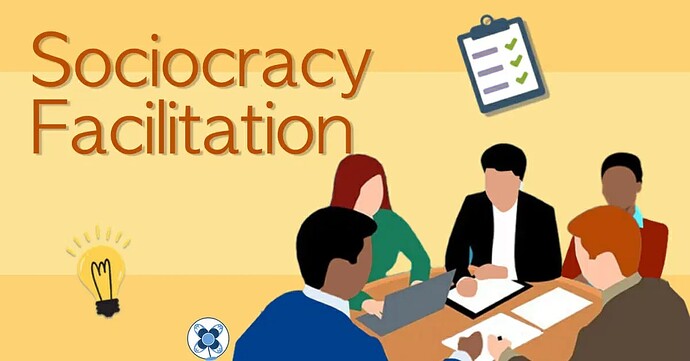Sociocracy is a system of governance that emphasizes collaboration and consent decision-making among the group members of a circle.
Facilitating sociocratic meetings can be challenging, but here are some tips and tricks to help make the process smoother:
- Start with an icebreaker:
Sociocratic meetings can be intense, so starting with an icebreaker can help set a positive tone and build a sense of community among participants. We will work better if we enter the meeting as humans, as we are. Recognizing our humanity helps us become more connected and collaborative.
- Define roles and responsibilities:
Let’s make sure that everyone knows their roles and responsibilities in the meeting. This includes the facilitator, secretary (note-taker), timekeeper, and other roles that may be needed.
- Use a talk-in-rounds approach:
To ensure that everyone has an equal opportunity to speak, use a round approach where each person takes turns speaking without interruption. This can also help ensure that everyone’s opinions and ideas are heard and considered. Equivalence is a core principle in sociocracy.
- Use visual aids:
Using visual aids such as whiteboards or flip charts can help participants understand the topics being discussed and keep track of decisions made during the meeting. A good AGENDA helps people to beter fooccus on the items we consent to discuss. Now, thechnology allow us to use virtual white-boards as well. To use all these we just need to train ourselves a litle bit.
- Use consent-based decision making:
Sociocracy emphasizes consent-based decision making, which means that decisions are made based on what everyone can live with, rather than unanimous agreement. A proposal could become a decision if there are no objects. This approach can help avoid deadlock and ensure that everyone’s concerns are taken into account. Of course, there are concerns that do not become objections. However, looking to consent by integrating any objection is the process we use to transform a proposal into a decision “good enough for now and safe enough to try”.
- Encourage active listening:
Encourage participants to actively listen to each other by repeating back what they’ve heard or summarizing what has been said. This can help ensure that everyone is on the same page and prevent misunderstandings. Active listening is a form of respecting other people and of self respect on the same time. Understanding each other helps us go on with our overal work and obtain the results we are looking for. Listening time is useful time, so let’s not ignore it.
- Manage time effectively:
Make sure that the meeting stays on track and that everyone has a chance to speak. This may require setting time limits for each agenda item and ensuring that the meeting doesn’t run over its scheduled time. If anything needs to be chande, make a proposal and ask for consent. If there are objections, respect them, understand them and reshape the proposal in order to work for all those with consenting rights. If proper done, the process of integrating objections helps us move on to consent.
By following these tips and tricks, a facilitator can ensure that a sociocratic meeting run smoothly and effectively, and that everyone’s voices are heard and considered.

Being a member of the Community of Practice for Facilitators (CoP-F) I invite you to join us by registering here:
Meeting time:
The meeting for this group is on the second Monday of each month for 90 minutes.
There are two different events on the same day:
CoP-F East: at 14:00 UTC
(for zones like Asia, Europe, Africa and eastern North America)
and
CoP-F West: at 18:30 UTC
(for zones like western North America, South America or Asia-Pacific).
We want to offer everybody the opportunity to choose a convenient meeting according to their/her/his time zone.
Community of Practice for Facilitators (CoP-F) disscusion forum page:
Meeting Facilitation and Decision Making Sheet article:
In the Community of Practice for Facilitators (CoP-F) no one teaches anyone, but we all learn from each other by practicing and sharing real life experiences.
We welcome your presence and contribution. It will enrich all of our sociocracy knowledge.
Best wishes to all of you!
